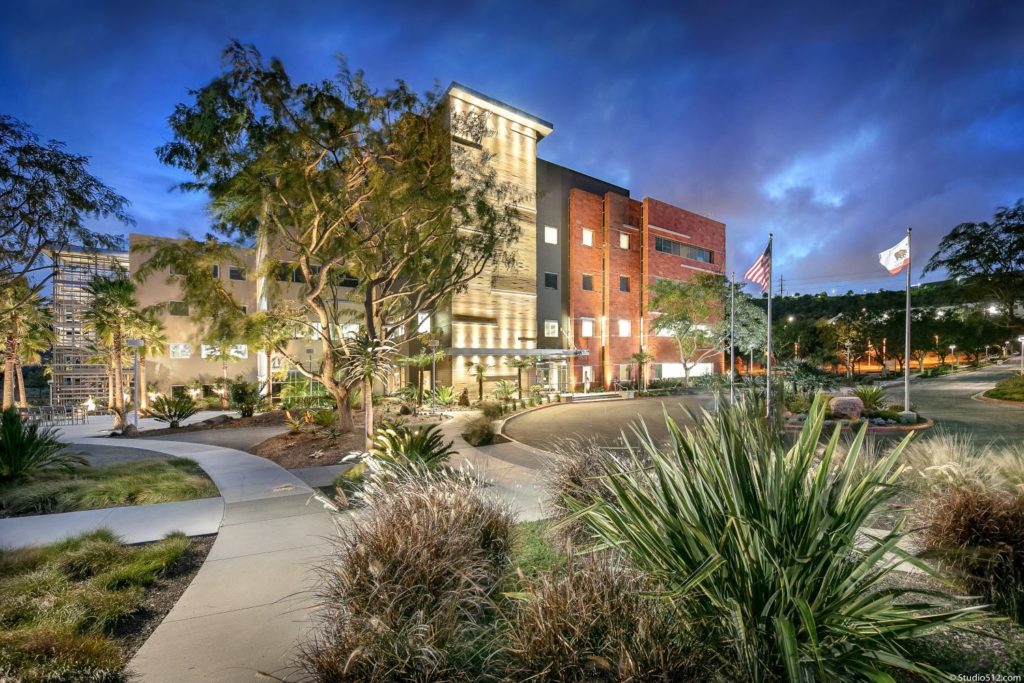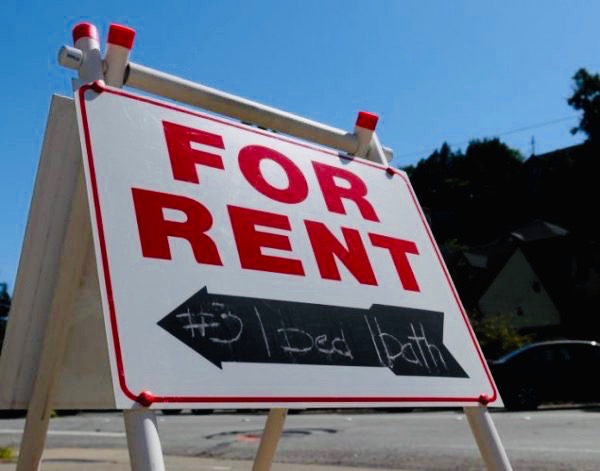Daily Business Report-June 3, 2019
Throughout the past year, rent increases have been occurring not just in the city of San Diego, but across the entire metro, according to the Rent Report. (CALmatters photo)
San Diego rents held steady over past month,
but have been rising across the region during the year
San Diego rents have remained flat over the past month, however, they are up marginally by 0.7 percent year-over-year, according to Apartment List’s National Rent Report. Currently, median rents in San Diego stand at $1,560 for a one-bedroom apartment and $2,030 for a two-bedroom. San Diego’s year-over-year rent growth lags the state average of 1.2 percent, as well as the national average of 1.5 percent.
Rents Rising Across San Diego Metro
Throughout the past year, rent increases have been occurring not just in the city of San Diego, but across the entire metro, according to the Rent Report. Of the largest 10 cities that we have data for in the San Diego metro, all of them have seen prices rise. Here’s a look at how rents compare across some of the largest cities in the metro.
- Chula Vista has seen the fastest rent growth in the metro, with a year-over-year increase of 1.7 percent. The median two-bedroom there costs $2,150, while one-bedrooms go for $1,660.
- Over the past month, El Cajon has seen the biggest rent drop in the metro, with a decline of 0.9 percent. Median two-bedrooms there cost $1,660, while one-bedrooms go for $1,280.
- Carlsbad has the most expensive rents of the largest cities in the San Diego metro, with a two-bedroom median of $2,470; rents grew 1.2 percent over the past month and 1.7 percent over the past year.
- National City has the least expensive rents in the San Diego metro, with a two-bedroom median of $1,350; rents fell 0.7 percent over the past month but rose 0.9 percent over the past year.
Comparable Cities Nationwide Show More Affordable Rents
As rents have increased marginally in San Diego, a few other large cities nationwide have also seen rents grow modestly. Compared to most similar cities across the country, San Diego is less affordable for renters.
- Rents increased slightly in other cities across the state, with California as a whole logging rent growth of 1.2 percent over the past year. For example, rents have grown by 2.3 percent in San Jose, 1.1 percent in San Francisco, and 0.7 percent in Los Angeles.
- San Diego’s median two-bedroom rent of $2,030 is above the national average of $1,190. Nationwide, rents have grown by 1.5 percent over the past year compared to the 0.7 percent rise in San Diego.
- While San Diego’s rents rose marginally over the past year, many cities nationwide also saw increases, including Phoenix (+3.9 percent), Austin (+3.6 percent), and DC (+2.2 percent).
- Renters will generally find more expensive prices in San Diego than most other large cities. For example, Phoenix has a median 2BR rent of $1,080, where San Diego is more than one-and-a-half times that price.
_______________________
Tenants’ righs vs. political reality
Inspired by Gov. Gavin Newsom’s call for tenant protections, several Democratic legislators convened a news conference in March to announce an ambitious plan to help renters with far-reach legislation. Then reality hit. The one significant measure from the March news conference that survives, albeit in a weakened form, is Assembly Bill 1482, by Democratic Assemblyman David Chiu of San Francisco.
- Chiu initially sought to cap rent hikes at 5 percent, plus inflation. To quell opposition from the real estate lobby, he agreed to cap annual rent increases at 7 percent, plus inflation, CALmatters’ Matt Levin reports. Inflation exceeded 3 percent in California last year and is running at 3.4 percent in 2019.
With the changes, the measure eked out of the 80-seat Assembly with 43 votes.
- Chiu said the bill would provide“some relief to millions of tenants one rent increase away from losing their homes,” assuming the Senate approves it.
Landlords won a significant victory Thursday when legislation to limit evictions stalled in the Assembly. Other bills announced in March are stuck in various committees.
Money matters:
- The California Apartment Association spent$280,000 on lobbying in the first quarter of 2019, and donated $25,000 to the California Democratic Party last week.
- The California Association of Realtors spent$417,000 on lobbying in the first quarter. The Realtors Association donated $610,000 to the California Democratic Party and $300,000 to the California Republican Party so far in 20
_______________________

Solar permits issued by county surge
The County of San Diego is on pace to have one of its busiest years for solar rooftop permits, and it could get busier as a 30 percent federal tax break to help offset the costs ends in 2019.
Through April, the 10th month of the fiscal year that started July 1, 2018 and ends June 30, the Department of Planning and Development Services has issued more than 5,700 residential solar permits. At that pace, the County would issue about 6,900 residential solar permits by the end of the fiscal year, a 25 percent increase over the previous fiscal year.
A 30 percent Solar Investment Tax Credit from the federal government has helped spur solar growth, but it will decrease over the next four years until it is eliminated for homeowners in 2022 and dropped to 10 percent for businesses. Despite the federal change, the County will continue to waive building permit and plan check fees for solar projects. Permits for solar projects can be done online and in-person, and the permits are typically processed within 24 hours.
Solar rooftops systems support the County’s sustainability goal that seeks to reduce greenhouse gas emissions and one strategy of the County’s Climate Action Plan is to increase the amount of renewable energy generated at existing homes. Proponents of solar rooftop systems say they generate clean, renewable energy, reduce greenhouse-gas emissions, can help consumers become self-sufficient and reduce their electric bills. County officials said more than 38,500 homes in unincorporated communities—roughly 22 percent—have solar rooftops.
In addition, the County helps support California’s 100 Percent Clean Energy Act, which became law in January, by continuing to waive fees. The act requires the state to get 60 percent of its total energy from renewable energy by 2030, and 100 percent by 2045. Renewable energy sources include solar, wind and hydropower.
_______________________
SDSU to require menB vaccine for all
incoming students effective in fall
Beginning fall 2019, all regularly enrolled incoming San Diego State University students will be required to receive the full meningococcal B (menB) vaccine series prior to the start of the fall semester. The change in policy affects only new, incoming students to the university.
Following three confirmed cases of meningococcal serogroup B at SDSU during the 2018-19 academic year — prompting health officials to declare an outbreak — SDSU moved to make the menB vaccine a required immunization.
The decision supersedes new California State University (CSU) immunization policies by rolling out the complete set of immunization requirements one full year earlier and making menB a required vaccine, as opposed to a recommended one. The requirements for immunizations, per CSU Executive Order, are meant to serve as a minimum threshold for all CSU campuses. These requirements will be reviewed annually and updated accordingly.
At SDSU, students will be required to present proof of immunizations by the schedule adjustment deadline, which is the 10th day of classes in their first semester. A class registration hold will be placed on the accounts of those who do not provide proof of immunization.
_______________________

TrellisWare Technologies signs lease for
added 27,000 square feet at Summit Pointe
JLL announced today that TrellisWare Technologies has signed a lease amendment with Newport National Corporation to expand into an additional 27,000-square feet of office space at Summit Pointe, a 146,626-square-foot office building located on 21 acres at 10641 Scripps Summit Court in San Diego. TrellisWare will now occupy approximately 100,000 square feet of space in the building.
Newport National Corporation completed redevelopment of this building in 2018. It is in the process of designing the second phase of Summit Pointe, which will feature the ground up development of a three-story, approximate 90,000-square-foot corporate headquarter office building. Construction is expected to start by the summer of 2020.
Summit Pointe’s first phase was designed in a collaborative effort by McCardle Architects Inc., DesignCorp, Environs and Newport National Corporation. It features a transformed lobby and common areas, bistro, conference center with catering kitchen, fitness facility and multi-purpose game room. Outdoor amenities include an amphitheater, exterior kitchen with barbeque station and bar counter seating, food truck venue and botanical gardens with over 1,000 different exotic species. Tenant well-being amenities include an indoor/outdoor fitness center, showers and lockers, indoor bike storage, mountain biking trails and half-court basketball court.
The remaining space in the first phase of Summit Pointe is able to accommodate a headquarters requirement ranging from about 8,358 square feet to 47,000 square feet.
TrellisWare Technologies is represented by David Crabb of Kidder Mathews and Don Mitchell of Cresa. Leading leasing efforts at Summit Pointe are Jay Alexander and Tim Olson of JLL and Chris Williams of Colliers International.
_______________________
Jeffrey Patterson elected managing
partner of Allen Matkins law firm

Jeffrey R. Patterson has been elected Allen Matkins’ new managing partner, effective July 1.
Patterson has played key leadership roles within the firm throughout his career. He is only the third managing partner since the firm’s founding in 1977.
Patterson began his career at Allen Matkins in 1986 in its Orange County office, moved to the San Diego office in 1990, and for the majority of his career practiced as a business litigator, bankruptcy and creditors’ rights attorney. He has served as the operating partner of the firm’s San Diego office since 2011 and as the firm-wide general counsel and on the firm’s Management Committee since 2012. He received his juris doctorate from University of Southern California Gould School of Law, and bachelor’s degree in economics and drama from Duke University. He is consistently named to Super Lawyers and Best Lawyers in America, and is the lead vocalist and keyboardist in a classic rock band.
Patterson succeeds David Osias who served as managing partner since 2012. Osias, also based in the firm’s San Diego office, will resume his water rights and receivership practices.



